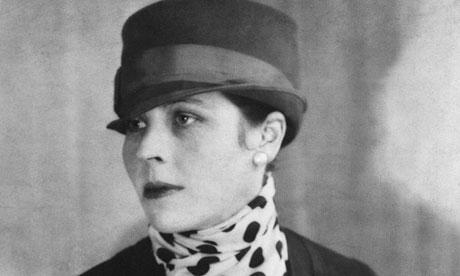 American novelist Djuna Barnes
American novelist Djuna Barnes
The Millions have published a list of what they regard as the 10 Most Difficult Books of all time, based on a variety of factors including length, syntactical complexity and abstraction. You can look at the list here. I’ve read three – Edmund Spenser’s The Faerie Queen, which I have been re-reading intermittently this year; Jonathan Swift’s A Tale of A Tub, although it was a fair while ago; and Virginia Woolf’s To The Lighthouse, the inclusion of which has caused most commentators to raise an eyebrow. I really ought to have read Samuel Richardson’s Clarissa; as for James Joyce’s Finnegans Wake, I’m not sure I’m ever going to tackle it. Nightwood is another one I should have approached – it’s mentioned in an Edward St Aubyn novel: Patrick Melrose carries it around in his pocket, along with Camus’ The Myth of Sisyphus, which, in imitation, I carried around in my pocket, although I never got round to reading it.
I’m not sure I agree with posting lists based on difficulty – who can say with any certainty what is difficult or not? Some might say that reading the Bible is difficult; what about reading The Aeneid in Latin, or Lucretius’ De Rerum Natura in English? What about reading the dictionary, as I’m sure some people have done?
It is, of course, entirely arbitrary, as it’s only really based on what the choosers of the lists have themselves read. So is there any point in it at all? Some people find some things difficult; others don’t. The point is that we should all challenge ourselves to read the unfamiliar, to grapple with things that are beyond our reach – until those things become in themselves easy. It’s like being an athlete or a concert pianist. Some are content to paddle in the tepid waters of Harry Potter and E L James; I’d argue that we should all push ourselves further. Only in this way do we grow. Otherwise we just stare at shadows, flickering on the back of the cave, unaware of the beauties and joys that exist outside. If anything, this list should make us all look behind us and into the light: it may be blinding, but through it, beyond it, there are universes to explore and inhabit. Although … maybe not Finnegans Wake.
An earlier version of this post appeared on Philip Womack’s blog

